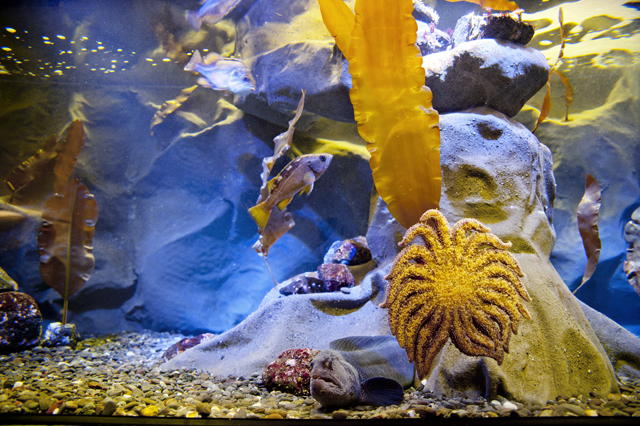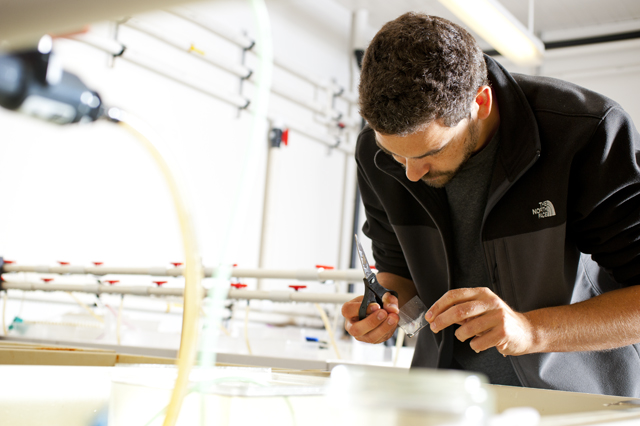
The improvements are the biggest made to the Lab since its expansion in 1974 and are designed to boost safety, accessibility and expand services for the facility’s 15,000 annual visitors and hundreds of student and faculty researchers.
Funded through a National Science Foundation grant, alumni contributions and private donations, the overhaul includes new digital displays highlighting local marine life, enhanced classroom facilities for students in the College of Natural Resources and Sciences and a refurbished wet lab for undergraduate and graduate research on marine organisms.
“What we’ve been able to do is to literally tear down the walls and start with a blank slate,” said Equipment Technician David Hoskins. “It’s really exciting for us, for our students and for the thousands of visitors we get each year.”
Improvements to the wet lab include new water tank stands, a research area for visiting scientists and an enhanced electrical and plumbing system, funded through a $200,000 grant from the National Science Foundation and $10,000 in alumni donations through the Humboldt Loyalty Fund. Installed by Hoskins and the Department of Plant Operations, the new plumbing system makes it easier for students to alter the temperature and salinity of water, broadening the scope of their research.
Graduate student Nick Perkins, who is using the lab to study an invasive moss Watersipora subtorquata that grows in the Pacific Ocean and off the waters of Australia, said the upgrades have already enhanced his research. “It was always a great lab,” Perkins said, “but now I have the ability to see how organisms grow in cold versus warm water simultaneously.”

Guests will notice several improvements to the visitor area, including the addition of 12’ x 5’ tank for viewing local marine organisms. Themed tanks highlight local marine environments such as the Humboldt Bay, the rocky-intertidal area and sandy habitat. Visitors can also learn about local marine life through digital displays featuring videos and photographs from Marine Biologist and Emmy Award-winning cinematographer Rick Rosenthal (’67, Zoology). The upgrades were made possible by a $100,000 donation from the United Plankton Foundation, a private foundation that supports marine science and $15,000 from the Desert Community Foundation (DCF), a Palm Desert, Calif. non-profit that allows donors to make contributions to causes that support their philanthropic goals. The Desert Community Foundation donation also funded upgrades to the lecture room, including new desks, compound microscopes and stereoscopes.
An additional $25,000 donation from the DCF will fund the conversion of a small laboratory into an aquarium room for the study of tropical fish. Construction on the room, which will include 30 to 40 five to ten gallon warm water aquariums, is expected to begin this winter.
The center’s culture room, which cultures algae and shrimp to feed the lab’s marine’s organisms, will also be renovated beginning in summer 2012. An official unveiling of the recent upgrades is planned for winter 2011.
Located on a cliff overlooking the Pacific Ocean in Trinidad, Humboldt State’s Telonicher Marine Lab was established in 1965 to provide a center for marine and environmental science teaching and research for students and faculty in the College of Natural Resources and Sciences. Undergraduates in the marine and environmental sciences perform two-thirds of research conducted at the center.
The lab has a circulating seawater system, lecture rooms and labs for biological oceanography, chemical oceanography, geological oceanography, marine biological sciences, mariculture and fisheries. Trinidad and Humboldt bays, the Pacific Ocean and local lagoons provide rocky and sandy inter-tidal and sub-tidal habitats for study.
Self-guided tours are available Monday through Friday, 9 a.m. to 4:30 p.m. and weekends 12 p.m. to 4 p.m. For more information, visit humboldt.edu/marinelab.